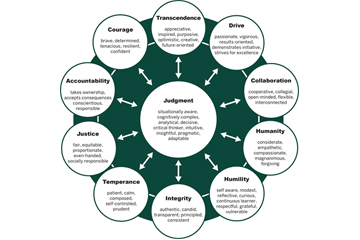Interviewing for Character – Vocabulary and Methodology
August 22, 2018

By: Dennis Ensing
We recently held a very popular and informative Lunch & Learn entitled “Character Matters”. This session featured Dr. Mary Crossan who presented research on behalf of a team at Ivey, focusing on the various dimensions of character and their impact on leader performance and outcomes.
Our interest was of course to make better-informed investment decisions about the founder of a particular venture. So this summer, I met with Dr. Crossan to discuss how to assess character in prospective investees. In particular, we would like to introduce character-based interview questions more deliberately into our screening and due diligence.
Character Vocabulary
At the Lunch and Learn, Dr. Crossan gave us vocabulary[1] to use as a common platform to describe the nature of the people in which we consider making an investment. Excellence of character is captured by a set of behaviours that directly influence the development of competence, the commitment to action and ultimately performance. Here are the 11 dimensions of character and their associated behaviors captured in the character wheel.
In our experience, venture founders with strong character have a developed capacity for accountability, justice and integrity (to name a few) that enable them to consider what are in the best long-term interests of all their stakeholders. The dimension of judgment plays a special role as a sort of regulator of all of the dimensions – it is what Aristotle called “practical wisdom”. It is vital to assess in our investment decisions since character is exercised through judgement and the quality of judgment directly impacts performance.
Assessing Character in a Pitch
In my follow up meeting with Dr. Crossan I found out that they do not offer a template that lists suggested questions or techniques to assess character. I did not actually find this surprising, but was still taken in by her rationale. Dr. Crossan advocates that it is not the questions in and of themselves, but who I am as an interviewer that really matters. If I am working on the “Leadership Virtues” in my own journey, then I should recognize them in others. Character is formed through experience and becomes habit. With my own experience and change of habits, I have a better basis to understand the dimensions of character and their associated elements – and most importantly authenticity in the interview.
For further insight, consider these good and bad outcomes of the presence – or absence – of the Virtues[2]:
| Virtue | Good Organizational Outcomes (Virtue is present) | Bad Organizational Outcomes (Virtue is absent) |
|---|---|---|
| Judgement | Quality decisions, calculated risk taking, committment, support, trust. | Lack a balanced assessment of the issues leading to misinformed decisions, confusion, resistance to change. |
| Humanity | Social responsibility, good employee relations, understanding support. | Misses critical social implications of decisions and actions. Alienation of followers, lack of respect for leader. |
| Justice | Use diversity, good employee relations, fairness, organizational citizenship behaviors. | Inequities not identified and manged thereby eroding trust, favoritism, nepotism. |
| Courage | Decisions made under conditions of uncertainty, confidence to act, opposition to potentially bad decisions, innovation. | Going along with poor decisions. Satisficing rather then maximizing. Moral muteness. |
| Collaboration | Teamwork, use diversity, cross-enterprise value-added, innovation, learning, affiliation, confidence. | Individualism alienates potential allies. Poor understanding of decisions, friction, conflict. |
| Accountability | Ownership and commitment to decisions and their execution. | Failure to deliver results and typically creates excuses for why not. Shirking of responsibility. |
| Humility | Continuous learning, quality decisions. Respect, trust. | Ego driven behavior, selective listening, difficulty admitting error or failure. Arrogance, overconfidence, complacency, hubris. |
| Integrity | Builds trust, reduces uncertainty, develops partnerships and alliances, promotes collaboration and cooperation. | Creates mistrust, requires firm guarantees, slows down action, undermines partnerships and alliances, reduces cooperation and collaboration. |
| Temperance | Quality decisions, reduced risk. | Short-termism, inability to see the possible constraints, instant gratification. |
| Transcendence | Focus on superordinate goals, big-picture thinking, strive for excellence. | Narrow aims, little inspiration, tunnel vision. |
It starts with our Character
With this knowledge of the Virtues, especially experientially, we have a way to understand the dimensions of character and their associated elements in others. Dr. Crossan pointed out to me that there are plenty of opportunities to develop and strengthen character in our everyday: our job, our life, and our relationships. For example, reflection about why you might be impatient, excessive, stubborn, or careless provides the raw material for examining and developing character.
So, in an interview with a prospective investee entrepreneur we must ask questions that go beyond competencies and commitment and not be afraid to ask entrepreneurs about experiences so we can understand who they are. The more that the interview becomes a conversation; the more likely we will exhibit our respect for who they are. Being authentic will be a risk for them but they should sense that it is a comfortable space where they can display that authenticity.
Learn more about the practical application of this character discussion in our next installment, coming soon.
